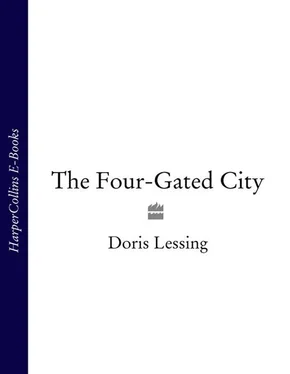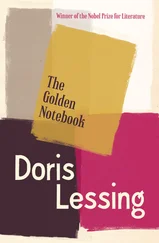Martha walked on to the river, still invisible, though she saw the ponderous buildings across it which were The City. She had to walk across the river, walk into a decision; not loiter and dally until she found herself back at the café with a joke that was the currency of false pleading: she had caught herself thinking, I’ll go back to the café and take off this coat before I … the coat was too hot. Mrs Van had had it during the war, that is, when skirts were knee-high and shoulders thick. Pulled tight around Martha it gave her the tight waist of that year’s fashion and came half-way down her calves – the fashion. But the folds which had once snugged Mrs Van’s large bosom pouted over Martha’s, and the sleeves came to her knuckles. She must buy a new coat. But she had no money. There were five pounds left. Which was why decisions were imminent and responsibility inevitable. She must make that telephone call today: she was to telephone Marjorie’s sister Phoebe.
A telephone box stood ahead. It had been, would be again, a military scarlet: now it was a pinky-orange with a bloom of damp on the paint. But it was a colour – Martha went into it. She opened the coat, propped the door of the telephone box with her foot and breathed the cool wet air in relief. Marjorie’s sister’s number was in her bag. She did not look for it. Instead she told herself that while Marjorie’s sister and what she stood for could wait, Joe’s mother and Jimmy could not. If she did not do something now, in four or five days’ time of this enjoyable lazy drifting on her inclination through London, saying every hour: I should ring the café, she would do no such thing, but simply turn up, and at the last moment and when she had to, for her suitcase. Which would really be letting them down. Though of course, ringing up now, half an hour after leaving when she could have said what she had to say, was letting them down. It seemed that letting them down was inevitable. Why? Had she made promises, offered what she had not given? She was not ‘Matty’! Could they have been so kind to Martha, had she not offered them ‘Matty’? It was too late now to know. She dialled the café and Jimmy answered. People had come in for tea and margarined buns since she had left: slack time was over, she could hear voices and activity. ‘This is Martha, Jimmy.’ ‘Oh, is that you, love?’ ‘Yes.’ Now, you will not make a joke of it She wrestled with the need to exclaim, laughing, that she had been just taken with a whim, a folly, an urge, mad Matty, oh dear, what a fool she was … ‘Jimmy, I’ve decided to leave.’ A silence. ‘Well, if it’s like that, love.’ ‘I’m going to take a job next week.’
Through these two and their friends she had been offered three jobs, not to mention Iris’s cousin, Stanley, as a possible husband. He said nothing. ‘I’ll come and pick my case up soon.’ ‘Half a tick then, I’ll call Iris.’ A clatter and a long pause. The voices went on. It was jolly in the café; people coming in knew each other, knew Iris and Jimmy. They had shared, many of them, their childhoods, their lives; they had shared, most of them, the war. And they had opened their hearts to her. Iris now said: ‘Is that you, love?’ ‘Iris, if you want to let your room, go ahead.’ Now that room was not easy to let, being a tiny box over the café, always noisy, and smelling always of frying-fat, the steamy tea, the fish: Iris knew Martha knew letting that room was not the point. ‘Are you all right, love?’ she asked, anxious. ‘Look, Iris …’ No, no, she would not play for false advantage. ‘I’ll come and get my suitcase sometime soon.’ ‘As you like, then. Well if you’re late coming in tonight, give us a shout.’ ‘I’ll pick it up in a couple of days, Iris.’ And now the moment of real hurt, betrayal, the end. Martha was proposing to wander off ‘with nothing but what she stood up in’ to take her chances for the night, and possibly other nights. And she had said it without remembering even to soften it. Martha could do that. Iris could not. No law said Iris could not: ‘Matty’ had made a joke of travelling with her life in a suitcase: two changes of underwear, two dresses and a couple of skirts and sweaters and some papers. Even ‘Matty’ had been careful of saying too much of how she had washed around London on this tide or that. Sometimes Iris said: ‘I must go up the West End one of these days and have a look around now the war is done.’ She had not been ‘to the West End’, two miles away and half an hour’s bus ride, since V.E. Day. She, limpet on her rock, had known that Martha had drifted and eddied around this city which she would never visit, never know, but it had not been forced on her, that knowledge, as Martha had done by saying so finally: I’ll pick up my case sometime soon. And now off Martha went, from them, Iris and Jimmy, as casually as she had come, by chance flopping down in the café for a cup of tea, her legs having collapsed from hours of walking. Now, Martha, standing in the telephone box, a third of a mile from Iris, feeling the wires buzz with uncomprehending hurt, fought her last and final battle, swore she would not make up some funny story about freebooting around London, she would not buy forgiveness. ‘You’ll come for your case then?’ ‘Yes, I’m not sure when, though.’ Silence. ‘Iris, I’m sorry,’ said Martha, sudden, sincere and desperate. ‘That’s all right, love,’ said Iris, cool.
What would be the words used to sentence her? She did not know, and it did not matter: what people actually said in that café was the least of what they were able to convey. But she had done it, she had not clowned or apologized in the wrong way. She had done it, if she had done it badly. And Iris would be slowly replacing the receiver, pushing the telephone back into its niche, and saying to whoever was there that afternoon, in one of her repertoire of tones which made her sparse vocabulary so rich an instrument: ‘That was our young lady. She’s off.’ ‘She’s off, is she?’ And that would be that.
Well, that was one door shut behind her; which proved that she would find the strength of mind to shut the others. Martha retied the coat, while tears ran down her face, cool on hot. She went on, crying, to the river. A ginger-moustached cloth-capped man passed, with a sideways furtive look that became knowing, diagnosing exploitable weakness. She frowned at him, and wiped the tears off – he went on his way. A moment later a young head came out of yet another hole in the ground where repairs were being made to subterranean London and a young voice said: ‘Cheer up, love.’
‘I don’t see why I should,’ said Martha, and he leaped up out of his hole. Martha smiled, friendly. He was tall and gangly, raw in bone and finish. Using a yardstick discovered since she had come to England, she mentally fitted him into the uniform of an officer of the RAF. Impossible. Impossible even if he hadn’t spoken and revealed his status in his voice? Impossible. She fitted him into the uniform of an aircraftman – yes.
Ever since she had come, she had used memories of the two nations which had descended on Zambesia at the beginning of the war to fit men into their appropriate class. She had not been wrong often. What was it? Not only bad feeding – this one had deprivation bred into him; it was something in the way of standing, the gestures, the eyes. And as for him, if she hadn’t spoken and shown she was from abroad and therefore outside his system of tabus, he would not have climbed up out of his hole. He had rather raffish blue eyes; and a come-and-get-me-smile evolved for such occasions.
But all that was put on, he was a gentle and serious soul. ‘Come and have a cuppa?’ he suggested, chancing it. Nearly Martha said: ‘Yes, I’d like to,’ but – couldn’t, having decided on the end to such enjoyable chances. ‘I’d like to but I can’t,’ she said, straight. He looked carefully into her face, placing her according to some rules of his own. Liking each other they stood, about to part for ever. Then he said, ‘Right then, another time,’ and he nipped back into the earth.
Читать дальше












